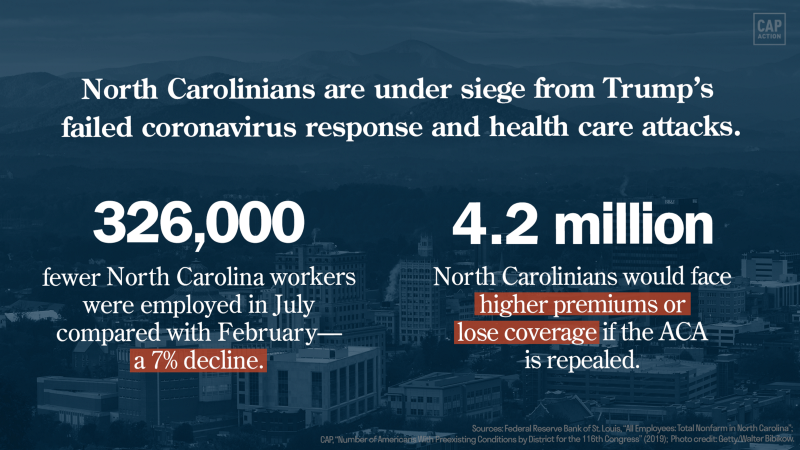
Today, President Donald Trump will arrive in North Carolina to hold another campaign rally amid the COVID-19 pandemic, this time at the Smith Reynolds Regional Airport. Last week, Trump hosted another in-person gathering, flouting social distancing guidelines in Wilmington, North Carolina to commemorate World War II veterans and designate the city a World War II heritage site. His feigned show of support for the military rang hollow as reporting came out last week alleging he called soldiers who died in combat “losers” and “suckers,” a sentiment echoing his attack on the late senator and Vietnam veteran John McCain.
Trump’s latest rally is another example of his willingness to put Americans, including North Carolinians, at risk. Earlier this year, he pressured North Carolina Governor Roy Cooper to host the Republican National Convention without social distancing guidelines, casually dismissing any health concerns that might arise from squeezing thousands of supporters without masks inside an arena to hear his acceptance speech. His administration’s botched handling of the coronavirus pandemic has led to the deaths of over 187,000Americans, including over 2,800 North Carolinians.
As a result of Trump’s failure to control the virus, the unemployment rate in North Carolina exploded to 12.8 percent in May, dropped down to 7.5 percent in June, and then increased to 8.5 percent in July. In the absence of federal leadership or any national testing plan, the virus continues to spread, and uncertainty has caused wildly unstable economic conditions in the state. As of August 22, more than 325,000North Carolinians are still receiving some type of unemployment benefits. In total, 326,000 fewer North Carolinians were employed in July compared with February — a 7 percent decline. On top of all this, federal data released late last month showed only 63 percent of NorthCarolina’s unemployment claims were paid in timely manner.
Instead of leading the country out of the pandemic, Trump has continued his long time assault on Social Security by calling for the termination of a large portion of its dedicated funding source — payroll taxes. Trump’s proposal, according to Social Security Chief Actuary Stephen Goss, would wipe out the Social Security Trust Fund by 2023. More than 2.1 million North Carolina residents are Social Security beneficiaries — roughly 1 out of every 5 state residents. Meanwhile, if the Trump administration-backed lawsuit to repeal the Affordable Care Act (ACA) succeeds, 4.2 million North Carolinians with preexisting conditions will face higher premiums or lose coverage altogether.
Learn more about how the Trump administration’s policies have hurt and put North Carolina families at risk below.
Health care
Promise: “[W]e can repeal and replace Obamacare and save healthcare for every family in North Carolina.” — Donald Trump in Raleigh, North Carolina, November 7, 2016
Reality: The Trump administration has doubled down on its commitment to taking health care away from millions of Americans while offering no viable replacement plan. Below are several ways North Carolinians would be harmed if the administration fully repeals the ACA:
- 607,000 North Carolinians would lose coverage, causing the state’s uninsured rate to increase by 43 percent.
- 4.2 million North Carolinians with preexisting conditions would face higher premiums or be barred from coverage altogether — a discriminatory practice that the ACA outlawed.
- 1.3 million North Carolinians would face cost limits on employer-based coverage.
Profits and wages
Promise: “I will be the greatest jobs President that God ever created … [O]ur poorer citizens will get new jobs and higher pay and new hope for their life.” — Donald Trump, October 5, 2016
Reality: President Trump promised voters that he would prioritize the interests of the middle class. Instead, his administration is rewriting the rules to reward corporate interests and making it harder for working Americans to get ahead:
- President Trump has the worst jobs record in history and is the only president to have lost net jobs on his watch.
- Trump blocked a federal minimum wage increase for NorthCarolina workers. Two million state workers were denied a pay increase resulting in $6 billion in lost wages.
- The Trump administration abandoned a rule designed to ensure that middle-class workers are properly compensated for working overtime, lowering the Obama-era income threshold so that fewer workers are covered. Under Trump’s proposed threshold, 278,000 North Carolinians would lose overtime protections, costing them a projected $38 million in lost wages each year.
- Trump’s Department of Labor weakened rules that required financial advisers to act in the best interests of their clients. Now, sophisticated investment advisers can effectively exploit consumers by offering conflicted financial advice, costing NorthCarolina retirement savers an estimated $427 million per year.
Taxes
Promise: “This is going to cost me a fortune, this [Tax Cuts and Jobs Act] — believe me. Believe me, this is not good for me.” — President Donald Trump, November 29, 2017
Reality: The Tax Cuts and Jobs Act gave significantly larger tax cuts to the wealthy than to low- and middle-income workers.
- In fact, 960,000 North Carolina households either received no tax cut or experienced a tax increase after the law’s passage. In contrast, three North Carolina corporations — Duke Energy, Honeywell, and SPX — and 50 other Fortune 500 companies paid zero federal income taxes in 2018.
- Instead of spending this windfall to improve workers’ wages or on capital investment — as the tax bill’s supporters claimed the company would — Honeywell spent billions on stock buybacks to enrich its executives and shareholders. And the company was not alone: Annual U.S. stock buybacks hit a record high in 2018 following the TCJA’s corporate tax breaks. The tax bill’s provisions for workers and families expire over time, while its benefits for corporations were made permanent.